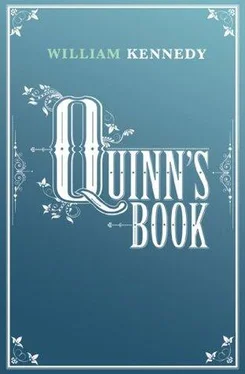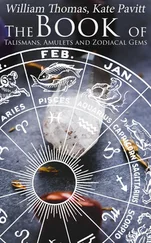And so when Quinn sat in the Eagle Tavern and ordered his whiskey toddies and grew garrulous, dropping the news that he’d seen niggers moving around near a cabin up the pike, then repeated his performance at the Bump Tavern at the next crossroads, well, it came as no surprise when Fletch and Blue turned up at his elbow, inquiring about particulars.
“You hunt niggers, is that it?” Quinn asked them.
“We take property back to its rightful owners,” said Fletch.
“A wonderful thing,” said Quinn. “Man owns somethin’, he shouldn’t oughta have to give it up, just on accounta the thing he owns don’t want to be owned no more. Man could lose all his cows that way.”
“Cows,” said Fletch, and he thought about that.
“You think you could show us where you seen them niggers?”
“Can’t really tell it,” said Quinn. “Don’t know the names of none of these roads, don’t know where nothin’ is, rightly.”
“You figure you could show us?” asked Fletch.
“I s’pose.” And Quinn mused on the possibility. “What’s the profit for a fella like me shows you what you’re lookin’ for?”
“You want profit, is that it?”
“Most folks do.”
“We’ll give you profit.”
“That case, we probably got us a deal.”
“Then let’s go.”
“How much profit you figure we’re talkin’ about?”
“We give you two dollars. You can buy a new horse with two dollars.”
“Not no kind of horse I’d wanna ride.” And Quinn fell silent.
“We’ll give you three,” said Blue.
“We’ll give you five, never mind three,” said Fletch.
“All you gonna give me is five? I was thinkin’ twenty ain’t a bad price for a couple of niggers.”
“Twenty; all right, twenty. Let’s go.”
“I’d like to get the feel of the twenty ’fore we go,” said Quinn.
“Give him twenty,” said Fletch. And Blue opened the flap of his shirt pocket and took out a fold of bills.
“You ready now?” Blue said when Quinn took the money.
“I’m ready,” said Quinn. “You ready?”
“We’re ready,” said Fletch. “But if’n we don’t get no niggers I’ll be lookin’ to get back that twenty.”
“Fair’s fair,” said Quinn, and he led the way out of the tavern, mounted his horse, and headed north on the turnpike.
Wrapped in blankets, the fugitive slaves squatted on the earth in a pit under the floorboards of the cabin, their retreat in times of threat. Planks covered their heads. Long slivers of light from the oil lamp in the second room of the cabin found their way down between the boards and into the soft clay cubicle of the slaves’ secret dwelling place.
Joshua added wood to the fading fire, the first time the stove had been used in the eight days the slaves had been here, for smoke is a traitor. In the second room of the cabin sat two white men with blackened faces, each with pistol and shotgun. When they heard the horses approach, the men took up prearranged positions and Joshua stood by the cabin door, carrying no weapon, and waited for the visitors to knock.
Quinn rode to the rear of Fletch and Blue when they neared the cabin and in his mind heard the music the two banjos made when the cadaverous dancer at The Museum sang his ditty:
Dere’s music in de wells ,
Dere’s music in de air ,
Dere’s music in a nigger’s knee
When de banjo’s dere.
And then Fletch was telling Joshua that they were working for the federal marshal to track runaway slaves. Joshua spoke in a voice foreign to Quinn, whining and mewling.
“I’s a free man,” he said. “Don’t know nothin’ ’bout no ’scaped slaves. Lived here all my days. You don’t believe that, go ask anybody here’bouts.”
“Ain’t you we’re lookin’ for,” said Fletch. “We’re after two niggers got only three eyes between ’em.”
“Don’t know nothin’ ’bout three eyes,” Joshua said. “You wanna come in and look, you can. I ain’t fightin’ no federal marshal. But ain’t nobody here but Mick the Rat, and that’s me, and that’s what is.”
“We’ll have a look,” said Fletch. He dismounted and tied his horse to a bush, and then with Blue behind him and Quinn bringing up the rear, the three entered the cabin. What Quinn saw was a long shadow of a man in the second room, and Fletch and Blue both drew their pistols and moved toward it. Joshua backed into the room ahead of them and turned toward the shadow, which was made not by a man but a coat and hat on a stick, at which Fletch and Blue pointed their guns. As they did, the shotguns of the blackfaced men rose out of the shadows to the level of their faces, and both slavers dropped their pistols.
“You lookin’ for us niggers?” said one of the blackfaces. “You wanna take us to Virginia?”
Fletch shook his head.
“Thought you did,” said blackface.
Joshua drew a knife from the scabbard on his belt and with deft strokes cut the belts and waistbands on the trousers of Fletch and Blue.
“Sit,” said Joshua, and Fletch and Blue sat.
“Take off your boots,” said Joshua, and they did.
“Stand up and drop your pants,” said Joshua, and they did.
Joshua left the room, lifted the planks, and helped the slaves up from their pit as the blackfaces led Fletch and Blue to the pit’s edge. The slaves huddled by the stove and watched as Joshua and one of the blackfaces tied the arms and ankles of the slave hunters. Fletch wore long underwear to his ankles. Blue’s went to his knees. Neither man wore stockings. When the slavers were bound, Joshua and one of the blackfaces rolled them into the pit.
“We gonna be leavin’ now,” Joshua said to them. “But thinkin’ about how you gonna be all alone down there, we got you some company.”
Then from a corner of the cabin, he dragged out a canvas bag the size of a small child. He undid its drawstring, then upended it, dropping two dozen live rats into the pit. The men yelled, the rats squealed. Fletch and Blue kicked at the rats and backed themselves into a corner together.
As Quinn raised the lamp to see what was happening, a courageous rat began climbing Fletch’s bare foot.
Fletch kicked it, and the rat flew against the wall and rolled over.
Then it righted itself, undaunted.
Quinn, at this point, let the twenty dollars he had taken from Fletch and Blue flutter back down to its rightful owners.
Capricorn was laughing so hard that tears were on their way.
“Oh, that Joshua, he wicked. That man, he know how to do it. How all that come out?”
“Joshua took the horses and they all rode north,” Quinn said. “I guess they made it. I never saw any of them again, except Joshua. Never did know those fellows in blackface.”
Quinn and Capricorn turned toward the house, walking past the pond Petrus built for the wild ducks, six of which were in residence. Quinn looked toward the house and saw Hillegond in the window fourteen years before, and he thought: Queen mother of compassion, I loved you.
But he would not weep.
He would not be diminished.
Joshua, a saint, could diminish Quinn, but not death, not even the death of queenly love. The war, wondered Quinn, astonished anew at his toughness — has it turned my soul into a lump of lead? He pictured the city of corpses where he had lived, and a fear gripped him. He was growing strong because of that city, preening with survival. One by one the corpses struggled upright, began a ragged march in his direction. He remembered his Celtic disk and he imposed its memory on this vision, raised it before his eyes like a monstrance, like a shield. Protected from corpses, he breathed deeply and walked toward the mansion.
Читать дальше












